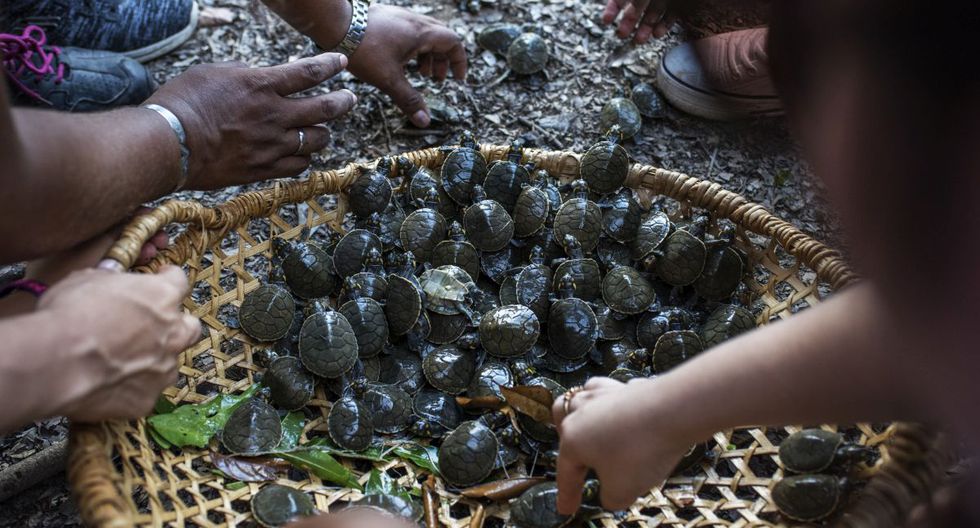Find out what’s new in our company and our brands around the world.
Around 5,500 hatchlings of Taricayan turtles swim freely in the Nanay, Itaya and Momón de Loreto rivers. They are the symbol of a mission taken on by the Loreto people: to save the rainforest, our green gold.
The meeting was in Maynas, province of Loreto, where we attended the celebration of the First Festival of Fresh Water Turtles. During this festival, approximately 5,500 baby taricayas were released and took their first steps towards the waters of the Nanay and Itaya rivers. Without knowing it, the small reptiles hatched on their way to restore the ecological balance in the jungle, hand in hand with the Loreto community. The repopulation of this species is an opportunity for the inhabitants to achieve a sustainable economic development, as well as to promote an eco-friendly education and culture with the region.
The pollution of freshwater rivers, the illegal trafficking of the species and, above all, the indiscriminate consumption of their eggs has put the taricayas in danger of extinction. Traditionally, this rich source of protein is exploited, but this has led to a drastic decrease in the species. As a result, the communities of the Loreto Amazon began to suffer from diseases such as anemia and malnutrition, since they do not have easy access to other basic foods that provide protein. However, the situation has begun to change.
UNITY IS STRENGTH
It was 12 noon when we arrived at the Plaza Bolognesi in the district of Iquitos to see a group of Taricayas being born, after having incubated for almost 70 days. There, in the center of the square, 2,380 eggs lay buried in the white sand of one of the 12 artificial beaches (exhibition modules, similar to a table of almost a meter tall and protective glass), installed in different parts of the city, such as Plaza Miguel Grau, in the district of Punchana; or Plaza Cardama, in the neighborhood of Belen. Before our curious eyes, three youngsters peeked out of the sand and left their shells behind. While the protagonists of this story were hatching, Luis Felipe Vela, an environmental specialist from the Provincial Municipality of Maynas, explained to us how and why, for the first time in 40 years – since the beginning of the project to repopulate the Taricayas in the Pacaya Samiria National Reserve (1979) – these eggs are incubated in the urban area. “What we seek is to raise awareness among the population of Maynas so that they become involved in the care and breeding of these taricayas. What we want is to encourage respect for the natural ecosystem, combat the indiscriminate hunting of these eggs and thus promote experiential tourism in the area,” says Vela.
Since this year, the project of repopulation of the Taricayas – a public-private initiative between state institutions, the district of Maynas and the business group AJE – took a turn. From now on, the population of Loretano, as well as the traveler who is passing through the province of Maynas, will experience the rescue of the Taricayas. In a first step, 463 families, members of 42 associations of the Pacaya Samiria National Reserve, collected a little more than 4 thousand taricaya eggs and sold them to AJE Group. The company moved the merchandise to the province of Maynas, where the turtle eggs were distributed on the artificial beaches.
After the nesting season, the turtles returned to their natural habitat and, with this, ecotourism was promoted, which improved the quality of life of the inhabitants. “The interaction of city dwellers with this project raises their awareness and promotes sustainable economic income; in turn, it helps to counteract anemia,” the specialist adds. “The Amazon communities now have an economic income: selling the taricayas so that they can grow, but, above all, it promotes experiential tourism by exhibiting this whole process with the turtle,” explains Jorge López Dóriga, executive director of Communications and Sustainability of the AJE Group. Valuing turtle care is beginning to be the solution to the indiscriminate hunting of this species.
